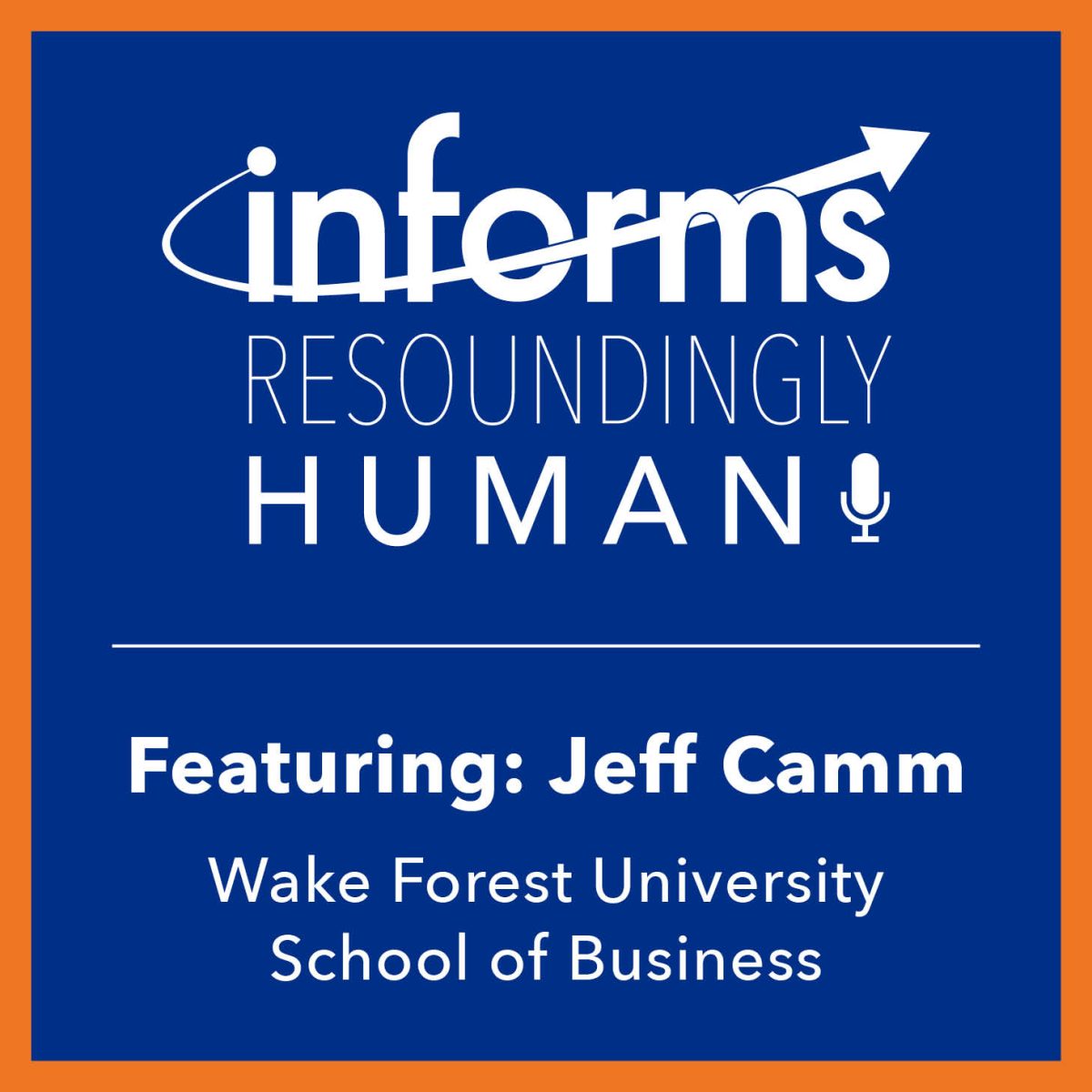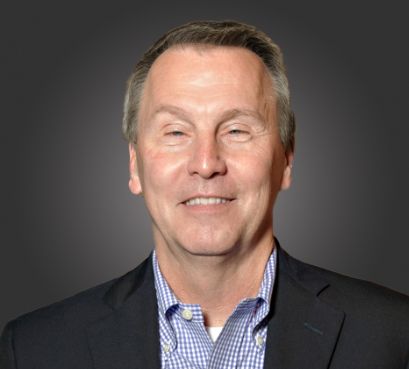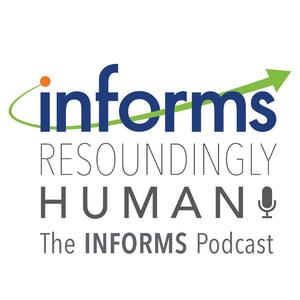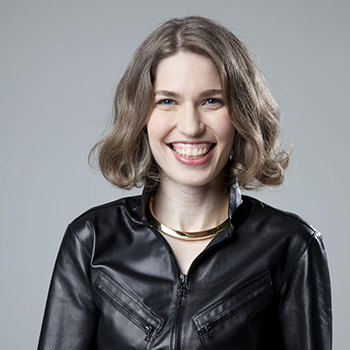Published: May 11, 2024

Welcome to the latest episode in a special series of the Resoundingly Human podcast, recorded in person at the 2023 INFORMS Annual Meeting in Phoenix. For this episode I am absolute delighted to be joined by Jeff Camm with Wake Forest University. Jeff is delivering the Omega-Rho Lecture: Reflections on the Profession of Operations Research and Some Thoughts on its Future and he is joining me today to share a special behind the scenes look at his presentation.
In some ways that big data phenomenon I think led to people focusing more on the data and less on the decisions and so there are pluses and minuses to the big data, if you want to call it the big data phenomenon. But it’s definitely helped bring to the forefront, analytics, O.R., management science, because we have so much data now, companies are being more data centric, so to me that’s been sort of the big paradigm shift with big data.
Interviewed this episode:

Jeff Camm
Wake Forest University
Jeffrey D. Camm is Senior Associate Dean for Faculty, the Inmar Presidential Chair in Analytics, and the Academic Director of the Center for Analytics Impact at the Wake Forest University School of Business. His area of research is applied optimization. A firm believer in practicing what he preaches, he has consulted for numerous corporations including among others, Procter and Gamble, Owens Corning, GE, Duke Energy, Tyco, Ace Hardware, Corning, Boar’s Head, Starbucks, Road Runner Sports, Brooks Running Shoes and Kroger. He previously served for six years as the editor in chief of Interfaces (now the INFORMS journal on Applied Analytics).
Jeff earned a PhD in Management Science from Clemson University and a BS in Mathematics from Xavier University (Ohio). Prior to joining Wake Forest, he held the Joseph S. Stern Chair in Business Analytics in the Lindner College of Business at the University of Cincinnati and he has been a visiting professor at the Tuck School of Business at Dartmouth College and the School of Engineering at Stanford University.
Related Episodes
Episode Transcript
Ashley K: As we gear up for our INFORMS annual meeting this fall in Seattle, I’m excited to share this latest episode, which was recorded in person during the 2023 INFORMS annual meeting in Phoenix, Arizona.
Ashley K: So we’re here at the 2023 INFORMS annual meeting in Phoenix, doing an in-person episode of the Resoundingly Human Podcast. I’m joined by Jeff Cam with Wake Forest University, and later today you will be delivering your keynote talk, the Omega Row lecture reflections on the profession of operations research and some thoughts on its future. And we’re going to take a few minutes to take a look at that session. So Jeff, thanks so much for joining me. I feel like I just interviewed you.
Speaker 1: Well first, thanks for letting be here, Ashley. Yeah, we did something in Aurora.
Ashley K: Yeah, we did. We had a TBD interview. So wait as we get closer to the analytics conference, we’ll reveal that. Exactly. So how’s your Annual Meeting going so far?
Jeff Camm: It’s been great. Had a panel this morning on experiential learning. That was great. Great discussion with the audience and yeah, it’s been going great.
Ashley K: So I’d love to hear when you’re pulling together a session like this for such a big audience, I think we’re at 62, 6500 people. What goes into pulling a session like that together?
Jeff Camm: So this is not a technical talk, so the one I’m going to give is more of a philosophical piece. And so we’ll see how that draws with a bigger crowd because I think I’m competing in the keynote slot with four or five other probably more technical talks. But I’m getting older and I think I’m getting more retrospective as I get older. And so what I thought was I’d use this opportunity, the platform that I had to sort of put out there what I think I’ve learned after 35 years in the profession. So this was easy. It was kind of fun putting this together because it let me put into a presentation things I’ve been thinking and talking to people about for probably 10 years.
Ashley K: Excellent. So as you mentioned, over 35 years of experience.
Jeff Camm: At least.
Ashley K: I guess I’m going to go with the number you put out. Yeah, let’s go with it. Yeah. What are some of the biggest changes that you’ve seen?
Jeff Camm: Yeah, so I’ve been thinking a lot about this probably. I mean, the merger was a big deal back, that’s a long time ago. That’s ancient history, the merger of Ora and Tims. But more recently, I think big data really did change dramatically the landscape for what we do. When I first started, we conceptualize a problem, we build a model, and then we would go look to see if we could get the data to populate the model. Now it’s just kind of reversed. There’s so much data and that’s great because now we can build these models and we have the data, but I think it’s led to this, I’ll talk this afternoon some more about data science versus what I think I do. And in some ways that big data phenomenon I think led to people focusing more on the data and less on the decisions. And so there are pluses and minuses to the big data, I think, what do we want to call it? The big data phenomenon. But it’s definitely helped bring to the forefront I think, analytics or management science because we have so much data now and companies are being more data centric. So to me that’s been sort of the big paradigm shift with the big data. Even ai, AI has been around for a long time, but now that we have all this data we can mine, it made it much more.
Ashley K: I was in another episode, I was really fascinated to learn how long AI has been around. I mean, it’s not a new concept actually.
Jeff Camm: You go all the way back to the fifties. Yeah, the fifties, sixties. Yeah. It’s kind of amazing. But with regard to AI chat, GPT is different. That’s a more recent phenomenon. It’s been like a lightning strike.
Ashley K: So without giving too much away, can you give us kind of a brief overview of what you’ll be talking about this afternoon?
Jeff Camm: Sure. We have a relatively new dean and she asked all of us on the leadership team to take strength finders recently. And I found out one of my top five strengths is context, which means I like to look back in time, learn from that and go forward. And that’s sort of what got me to where I am with this talk today. So I’m going to give it through history of or as I know it, things that have happened in my lifetime, like what we just talked about that the advent of big data and elaborate on the sometimes messiness of all that. And I hope maybe my overall message will be we should as a profession and as a society informs take more control of where things go. And if you want to know what I mean about that, you maybe have to show up the talk. We can talk more about it if you want to. Definitely. A lot of it is labels really, I think matter more than some people think.
Ashley K: So one thing you mentioned in the overview of your session is missed opportunities. What are you referring to with that?
Jeff Camm: Sure. So going back to the merger, there was orsa and Tim’s Orsa. There should be a caption that says, this is Jeff’s opinion. There’s Orsa and Tim’s Orsa was primarily engineering and math and operations research was a label that was used as we came out of World War ii. I wasn’t alive then, by the way, but that was because they had done research on operations. So it was called operations research. And then if you fast forward what happened, there’s a great book by John Byrne who now heads up the poet and quants website if you’re familiar with that. But John wrote this book called I have heard of it. Yeah, it’s called The Wiz Kids. And it’s about how people came back from the war and I guess transferred what we learned about what is now operations research during the war into industry, particularly at Ford Motor Company. So long story short, there was operations, research and management, science operations research was math and engineering and management science tended to be in the business schools.
Ashley K: Right. Interesting.
Jeff Camm: And we had separate meetings combined. So fall was orsa, Tim’s and Spring was Tim’s Orsa. So you can imagine the fact that they had to change, had two names, tells you something about how the heads were budding together. And then when orsa and Tims merged into Infor, I think one of the missed opportunities was creating an umbrella label for what those two things really are. Let me explain a little bit more. Operations research originally was research applied to operations. Then what bene talks about in Wiz Kids is that was translated to industry and became management science. And the emphasis is very different in those two areas. One is more business centric, the other is more engineering. So naturally more production, supply chain, all those kinds of more technical areas. Whereas management science went into finance and marketing. And I think at that merger there was an opportunity to create a term that bridged those two differences.
Jeff Camm: In fact, I do some of this. I do applications in marketing. Well, it’s kind of awkward for me to say I’m an operations researcher when I’m doing marketing, I’m applying the techniques of operations research to marketing. I was more comfortable with management science, but that goes in both directions. Some of the engineers, I don’t want to have anything to do with management. In fact, one of my math professors in undergrad, I told him I was going to get my PhD in management science. And I’ll never forget, this is my advanced calculus teacher. He said, that sounds like a contradiction in terms to me, management and science. What are you talking about? So I don’t think either one of those labels are as inclusive of what the profession of operations research now is. And so I have a couple of ideas that I think we should have done during the merger. I’ll go ahead and throw it out there, and we’re starting to see it now. I think what we do is decision science doesn’t matter if it’s in engineering, it’s a term familiar with it’s about, and we have a new tagline we do. I think that maybe supports my thinking.
Ashley K: Yes, I was going to say this sounds like it’s very much in line with that whole effort that informs undertook this year.
Jeff Camm: Year. And I also think now that we’ve been through the whole, it’s still going on, but the whole data science craze, which again, what I think was created by big data, there’s sort of a symmetry and it’s an easy explanation to distinguish. I think our profession from data science, or maybe we want to include it all together, but there’s data science and there’s decision science, data science is data centric. Decision science is decision centric. And I’ll go into a lot more detail this afternoon, but that’s one of the missed opportunities, I think.
Ashley K: Yeah, definitely. I mean, it’s still something that reverberates today, and I do have to say that as somebody who is adjacent to the fields working for informs, those are some of the best descriptions of those terms and the relationships that I’ve ever heard. So people coming to your attendees, coming to your session today are in for some very thought provoking insights. So looking all the way back to the beginning, what made you excited to go into the field that you’re in?
Jeff Camm: Great. Great question. So I was a math major undergrad. I went to Xavier University in Cincinnati. I grew up right outside of Cincinnati in northern Kentucky. So I was a math major at Xavier. And my junior year, at the end of my junior year, one of the professors at Xavier who was in management actually information systems and management, asked me to be a graduate assistant my senior year. And it turned out he had written an operations research textbook. And so my job as his graduate assistant my senior year was to work through the problems in his book. And I thought, this is pretty interesting because I was a math major, but I was either going to go on to grad school or I was going to teach high school math and coach track and cross country. Those are my goals. So then I did some student teaching and I thought, oh, I don’t know about this high school teaching.
Jeff Camm: Those people are saints because a lot of it’s discipline. So I decided to go on to grad school, and one of the things that really I think maybe made me go into the field was Linus Roy at the University of Chicago, I think he’s emeritus now. He had written a program called Lindo. So I’m working these problems for this textbook for my professor, and they’re linear programs. And the package lindo came out right then, and I was just shocked because you could type in the model the way you would write it down, the algebra and hit go and it would solve the problem. And I’m like, this is unbelievable. And long story short, I kind of fell in love by going through that book. I fell in love with the field and had a professor at Xavier who had spent time at Clemson and Clemson had, at that time a management science program, which was way ahead of its time. I literally took half my classes in business and half in the math part of it. So today it would probably be called analytics. But yeah, so I love to solve problems and always even like an algebra class, everybody else hated the word. We call ’em worded problems. The paragraphs a train leaves New York, I’m all over that. I love that stuff.
Ashley K: Those are the ones I dreaded.
Jeff Camm: Oh gosh. There’s no in between with those. Either you love them or you hate them. So yeah.
Ashley K: How so is the problem solving what keeps you excited?
Jeff Camm: It is. Okay. Yeah. Yeah. I really like solving problems. I’ve always worked on things that some company cared about, so I wasn’t one to just sit in there and think of an extension of some theory or something like that. I’ve always tried to work on a problem that somebody cared about and worked a lot with Proctor and Gamble when I was in Cincinnati, so I like to solve problems.
Ashley K: Excellent. Well, you’re in the right field I guess. Jeff, thank you so much for taking time out of your meeting schedule to welcome, sit down and talk with me. Good luck on your session this afternoon. I’m looking forward to it.
Jeff Camm: I appreciate the invitation, should be fun. We’ll have fun for sure. Alright, thank you. Thank you.
Want to learn more? Check out the additional resources and links listed below for more information about what was discussed in the episode.
Jeffrey D. Camm



